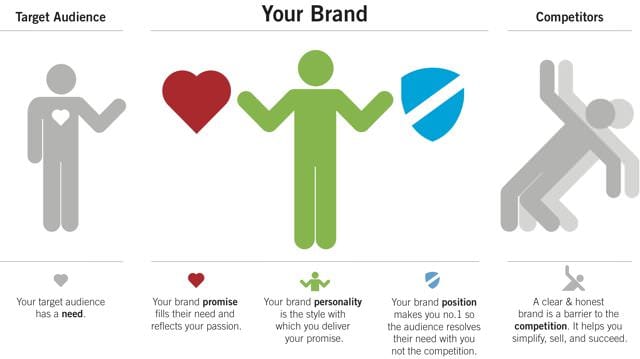Why you need a plan to defend and improve your online reputation
In an online world of viral news articles and social media, your brand’s image is something that can quickly be affected by even the slightest misstep. That’s why protecting your brand’s reputation is more important than you’ll ever realize.
The Significance of Your Online Image
It’s easy for us to forget that the internet is still a relatively new business channel. When we look back on the history of the internet in 25 or 30 years, 2017 will still look very much like the Wild West. Rules are still being developed, concepts are just now being understood, and what works isn’t always clear.
But when you cut through all of the unknowns, it doesn’t take an advanced degree to recognize the importance of maintaining a strong online image. Information spreads fast online and you have to keep up.
The internet gives everyone a voice. Suddenly, anyone from anywhere can share their thoughts and opinions in highly visible places. This is great news for businesses that promote positive interactions with customers and do an effective job of satisfying their needs. But it can also be perilous and damaging for businesses that slip up and make mistakes with customers. The fact that anyone can post anything at any time is most definitely a double-edged sword.
Download Expert Member resource – Digital Branding Guide
This new guide by Debbie Inglis offers a detailed, 7 steps strategy to enhancing digital brands, aimed at FMCG brands or those who need to understand core branding concepts.
Access the Digital Branding Guide
When you hear the word reputation, what comes to mind? Most people think about how individual people are viewed by those around them. And while we, as individuals, each have our own reputations, brands possess them too. In today’s business landscape, a brand’s reputation is often determined by its online image. Just consider the following statistics as presented by Reputation X:
- Businesses with mostly one-star and two-star reviews fail to convert roughly 90 percent of prospective customers online.
- 92 percent of American consumers read online reviews to learn more about businesses.
- When it comes to conducting research on a brand, 65 percent of global customers trust search engines the most.
Each of these statistics proves the importance of a brand’s online image and how easily your company’s reputation can be influenced. If you aren’t paying attention to your brand’s online reputation, then you’re missing out on a massive opportunity to strengthen your relationships with customers and drive real results.
Six Ways to Protect Your Image
When most companies think about the idea of online image/reputation management, they take a reactive approach that’s designed to identify isolated issues and combat them before they become major problems. And while there is a time and a place for this – we’ll discuss a couple of situations in this article – a primarily reactive approach is not the way to go. Protecting your image and building a strong reputation requires that you take a proactive stance. Keeping that in mind, here’s an approach that properly balances both reactive and proactive steps.
1. Set Up Google Alerts
Knowledge is great, but having a tool that perfectly fits the task at hand is even better. And when it comes to keeping tabs on your brand’s online image, Google Alerts is the best tool around. It allows you to set up alerts that notify you when somebody mentions your brand – good or bad. You can even use it to study your competitors and keep up to date on what’s happening in your industry.
As a Google product, it comes as no surprise that the tool is incredibly intuitive. All you have to do is enter keywords that you’re interested in, set your alert options, and establish filters for how often you’d like to get alerts. There is one downside to Google Alerts currently – that you can’t conduct social listening. Thankfully, there are other tools for this task and we’ll discuss them in further detail in the next section.
“Google Alerts is one of the quickest and easiest tools you can use to track mentions and alerts. It’s also 100% free, which is another reason it’s a great first stop,” SEO professional Colin Newcomer says. “Just make sure you don’t overwhelm yourself with alerts. Too much information can be just as bad as no information. If you find yourself skipping alerts because you don’t have enough time, it may be time to pare down your keywords.”
2. Become a Social Listener
Ancient proverbs often discuss the merit in being slow to speak and quick to listen. Unfortunately, this is a lost art in today’s world. It’s especially become overlooked in the realm of social media where users are constantly fighting to be first. From customers and brands to reporters and news outlets, everyone has the need to say something first. What few realize is that this approach leaves very little time to listen. And as philosophers of the past and present share, the ear is much more valuable than the tongue.
You can protect your brand’s online image more through listening than you can through speaking (i.e. posting). Just as you set up Google Alerts for your brand, you should follow the lead of successful brands and create a plan for social listening.
With social listening, there are dozens of powerful tools. The key is to find the one that fits your needs. Some of the top choices include Hootsuite, Buzzsumo, Brandwatch, and Keyhole.
3. Launch a Content Strategy
The best way to proactively strengthen your online reputation in today’s market is to invest in authoritative content. The internet runs on content and you can’t afford to rely on what others are saying about you. Take things into your own hands by making blogging a priority.
With a content strategy, you can address problems as they emerge, build content around your brand’s values, and directly engage customers, without the need for a middleman or third party channel. It’s taking your reputation into your own hands.

4. Carefully Monitor Feedback
“One of the best ways to maintain a positive reputation online is to be proactive about customer service and responding to reviews and other online feedback,” says Wisconsin Media. “According to a survey by Edison Research, when contacting a company for support through social media, 42% of consumers expect a response within 60 minutes. The fast-paced and public nature of social media requires companies not only to respond quickly but also to resolve the customer’s concerns effectively.”
In other words, you aren’t just listening to what your customers are saying. In order to strengthen your reputation, you have to listen and engage/respond. It can take a lot of time and effort to fully invest in monitoring social media, but you’ll gain perspective when you view it as an extension of your larger customer service strategy.
5. Let Reviews Guide Anticipatory Decision Making
If you’re in a big industry, then there are probably dozens of websites on the internet that allow customers to post reviews about your products and services. Anywhere your products are sold, there’s most likely some sort of feedback feature for customers. There are also sites solely dedicated to rating companies in your niche and you may be surprised to learn that your brand is included.
While the positive reviews are great, many brands avoid checking their online reviews because they’re fearful of the negative ones. Don’t shy away from reviews, though. Positive or negative, they contain valuable nuggets of information that can be used to guide your future decision making.
When you see themes in reviews – such as slow delivery times or fantastic email support – use these insights to improve the value you pass on to your customers moving forward. This is essentially free consumer data so don’t let it go to waste.
6. Find a Partner
If you find your brand’s reputation in the proverbial dumps, then you may need a little help digging your way out. The good news is that there are a lot of professionals and companies that specialize in online reputation management and brand building. Consider aligning yourself with one of these resources for a few months to get back on track. Then, using the valuable principles you’ve learned, you can regain control in the future.
The key is to find a partner that’s worth the investment. The reputation management industry is largely unregulated and there are plenty of bogus companies out there. Do your due diligence and find one that lives up to their claims.
Prioritize Your Reputation With Proactive Efforts
Your brand’s online reputation need to be a bigger priority in 2017. As more and more customers proactively seek out brands online and form opinions based on the information they find, you also need to become more proactive in your approach.
The good news is that it’s pretty easy to get started. There are dozens of small things you can do this week to get your brand’s online image pointed in the right direction. Once you get these issues squared away, you can turn your attention towards the bigger strategic goals and work on strengthening your reputation from the inside out.

Thanks to
Anna for sharing their advice and opinions in this post. Anna is a freelance writer, researcher, and business consultant. A columnist for Entrepreneur.com, HuffingtonPost.com and more, Anna specializes in entrepreneurship, technology, and social media trends. Follow her on
Twitter and
LinkedIn.





 Thanks to
Thanks to 



